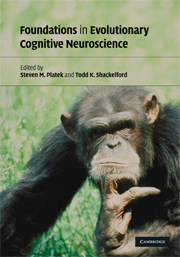Book contents
- Frontmatter
- Contents
- List of contributors
- 1 Introduction to evolutionary psychology: A Darwinian approach to human behavior and cognition
- 2 The evolution of general fluid intelligence
- 3 The role of a general cognitive factor in the evolution of human intelligence
- 4 Where there is an adaptation, there is a domain: The form-function fit in information processing
- 5 Invention and community in the emergence of language: Insights from new sign languages
- 6 Origins of the language: Correlation between brain evolution and language development
- 7 The evolutionary cognitive neuropsychology of face preferences
- 8 Sex differences in the neural correlates of jealousy
- Index
1 - Introduction to evolutionary psychology: A Darwinian approach to human behavior and cognition
Published online by Cambridge University Press: 20 January 2010
- Frontmatter
- Contents
- List of contributors
- 1 Introduction to evolutionary psychology: A Darwinian approach to human behavior and cognition
- 2 The evolution of general fluid intelligence
- 3 The role of a general cognitive factor in the evolution of human intelligence
- 4 Where there is an adaptation, there is a domain: The form-function fit in information processing
- 5 Invention and community in the emergence of language: Insights from new sign languages
- 6 Origins of the language: Correlation between brain evolution and language development
- 7 The evolutionary cognitive neuropsychology of face preferences
- 8 Sex differences in the neural correlates of jealousy
- Index
Summary
Charles Darwin's (1859) theory of evolution by natural selection is among the most important scientific theories and is the most important theory in all of the life sciences. Some have even argued that the principles of Darwin's theory can explain the laws of physics and the organization of the universe (e.g., Dennett, 1995). Although Darwin's name is synonymous with evolution (which refers to the modification of traits with descent), philosophers and scholars were thinking about evolution long before Darwin. In fact, one of the first discussions of evolution pre-dates Darwin by two and a half millennia. Anaximander, a Greek philosopher, suggested that “in water the first animal arose covered with spiny skin, and with the lapse of time some crawled onto dry land and breaking off their skins in a short time they survived.” Even Darwin's grandfather, Erasmus Darwin, wrote of common ancestry and speciation. What Charles Darwin (1859) provided, however, was a viable working mechanism of evolution: natural selection. Darwinian selection has become the centerpiece of biology, and in the last few decades, many psychologists and anthropologists have recognized the value of employing an evolutionary perspective in their work (for early writings see Barkow, Cosmides, and Tooby, 1992; Chagnon and Irons, 1979; Daly and Wilson, 1983; Symons, 1979). With a focus on evolved psychological mechanisms and their information processing, evolutionary psychology has risen as a compelling and fruitful approach to psychological science. This chapter provides an introduction to evolution by natural selection and its modern application to the study of human behavior and cognition.
- Type
- Chapter
- Information
- Foundations in Evolutionary Cognitive Neuroscience , pp. 1 - 21Publisher: Cambridge University PressPrint publication year: 2009
- 1
- Cited by



